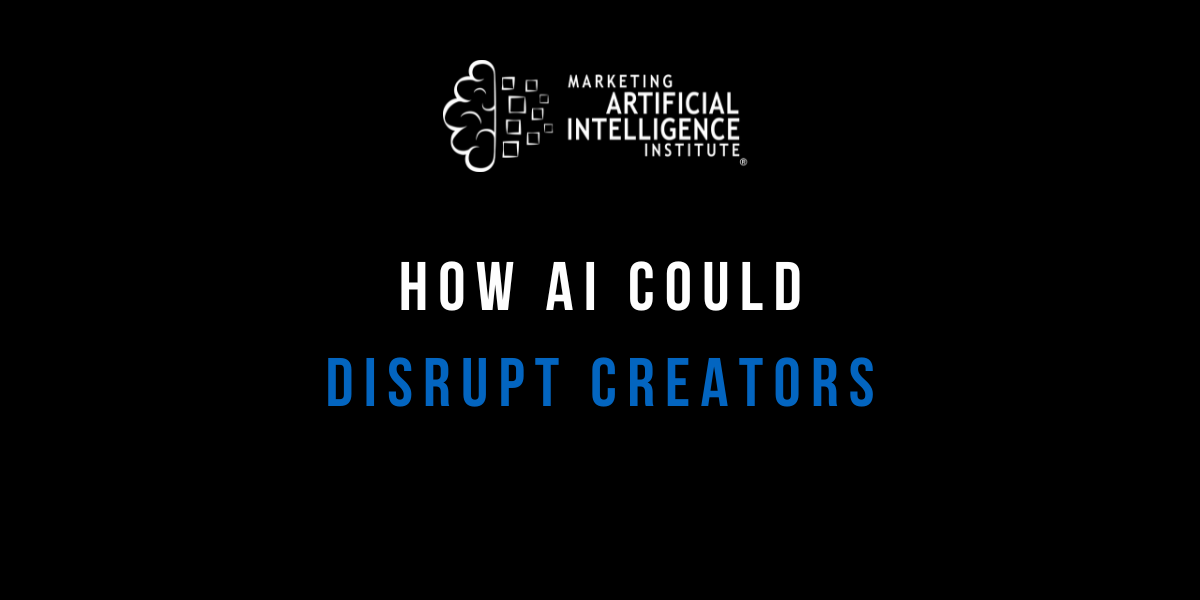Some creators are starting to get seriously worried about AI.
The Information did a deep dive into how generative AI is impacting creators and media platforms like YouTube and Netflix.
And it revealed some ways that AI might disrupt creators in the near future.
Me and Marketing AI Institute founder/CEO Paul Roetzer break down what, if anything, creators need to be worried about on Episode 86 of The Artificial Intelligence Show.
Creators have three big fears about AI
The Information outlines three big fears that creators have around AI. They include:
- The fear that AI-generated content will begin to flood platforms. (Spotify, for instance, has already seen an influx of AI-generated music.)
- The fear that audiences will develop an appetite for AI-generated content.
- The fear that the benefits of using generative AI will force everyone to produce AI-generated content to compete.
One example of this last point is Netflix.
The company told the SEC in its annual report: "If our competitors gain an advantage by using [generative AI], our ability to compete effectively and our results of operations could be adversely impacted.”
AI is already disrupting some creators
In some cases, AI is already disrupting how creators do their work:
The Information interviewed a YouTube creator named Kwebbelkop with 15M+ subscribers. For years, he's experimented with using AI to create his videos. (At one point, he even created a full AI-generated persona to star in his videos.)
He says AI now allows him to work with half the team and half the budget he did just 2 years ago.
He also said that AI's impact will be profoundly disruptive to creators, saying:
"If you don’t embrace AI, it will replace you.”
But some aren't worried
But it sounds like YouTube at least isn't worried...
In a letter last month to creators, CEO Neal Mohan said:
"AI should empower human creativity, not replace it. Everyone should have access to AI tools that will push the boundaries of creative expression.”
Some creators agree with him.
One interviewed by The Information said:
“It is in our DNA to tell stories and hear stories being told.”
What does this all mean for creators?
"I'm a writer by trade," says Roetzer. So he thinks about the impact on creators through that lens. And thinking about AI's impact on creators means understanding why we create in the first place.
There are two reasons we write—or create in general—he says.
One, we create as an end product for someone else. We create videos, games, artwork, articles, and more for someone else, so they gain something from it. That might be enjoyment, entertainment, or some other outcome.
"There's no reason AI can't do that," says Roetzer. "It's capable of that. And you could use AI purely to do that."
But the second reason we create is for ourselves. And using AI solely to create means you lose this second big reason why we do what we do.
Writing, says Roetzer, helps him express himself. It helps him organize his thoughts and reflect on his experience.
"Writing is a craft to me. It's not just about the end product. I don't want AI to take that away."
In other words, just because we can use AI for every aspect of creation doesn't mean we should.
"It can create outputs that people may find enjoyable. But that doesn't replace the artist or creator themselves needing to find enjoyment from the process of creating things."
Mike Kaput
As Chief Content Officer, Mike Kaput uses content marketing, marketing strategy, and marketing technology to grow and scale traffic, leads, and revenue for Marketing AI Institute. Mike is the co-author of Marketing Artificial Intelligence: AI, Marketing and the Future of Business (Matt Holt Books, 2022). See Mike's full bio.



